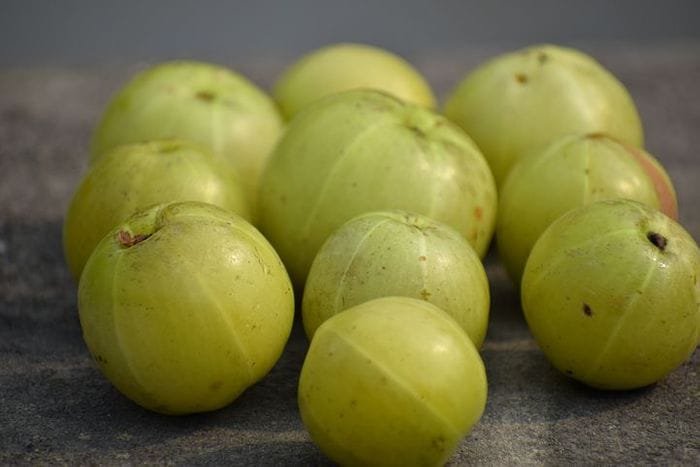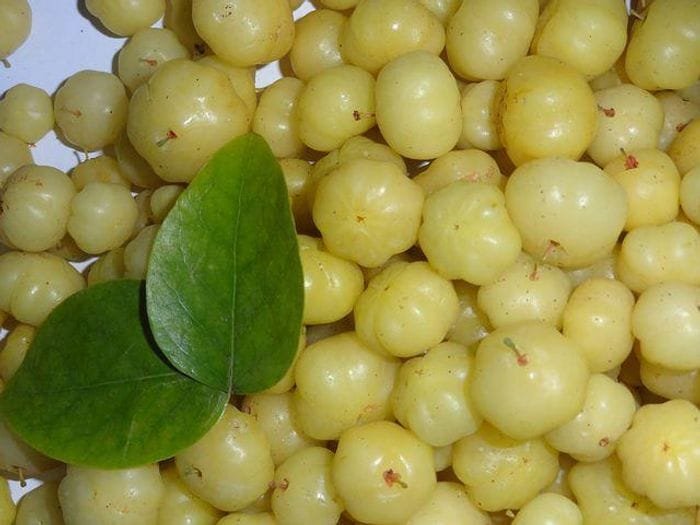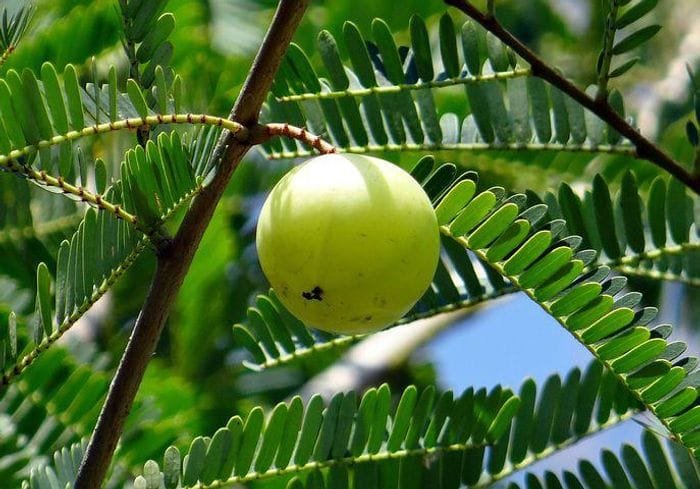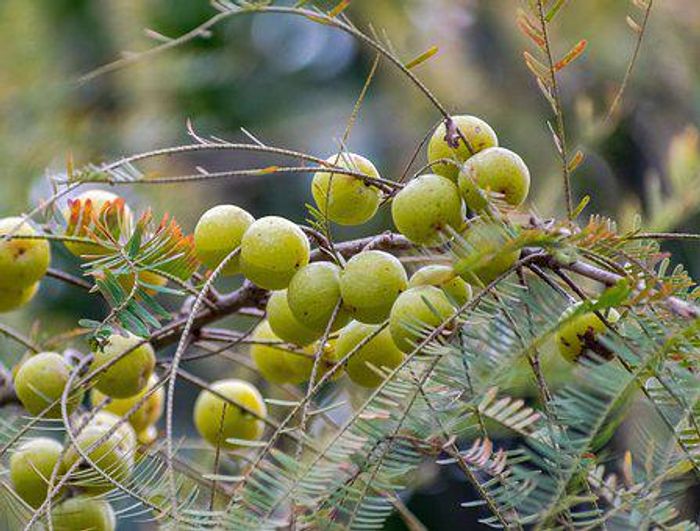10 Health Benefits Of Indian Gooseberry (Amla)
The benefits of amla are many. Amla is like a doctor’s medicine, which is bitter, but it is effective in curing the disease. Amla works as a sanjeevani in eradicating many diseases including keeping old age away, increasing memory power. Ayurvedic practitioners say that amla is an abundant source of antioxidants and nutrients. Amalaki means “mother” and “life giver” which has medicinal and nutritive properties.
What Is Amla (Indian Gooseberry)

Amla is described as a rejuvenating herb in two of the most prominent texts of Ayurveda, Charaka Samhita and Sushruta Samhita. Not only this, in Indian mythology, Amla has been called a tear (tear) of Lord Vishnu. Amla is also called Amrutphal or Dhatriphal in Ayurveda. The botanical name of Amla (Scientific name of Amla) is Phyllanthus emblica L. (Pylanthus emblica) Syn-Emblicaofficinalis Gaertn. It is from the Euphorbiaceae (Euphorbiaceae) family. Its English name is Emblicmyrobalan tree (Emblic myrobalan).
Amla Powder Benefits
Amla is used in many ways, such as- Amla juice, Amla powder, Amla pickle etc. Most people also think about gooseberry that gooseberry should not be eaten in cold, but according to Ayurveda, consuming gooseberry in cold season protects you from many diseases. According to doctors, our body needs 50 mg of vitamin daily. If someone eats even one gooseberry every day, then there is no deficiency of vitamins in the body.
Amla Nutritional Information

Elements found in half a cup of amla –
- calories: 33
- Protein: Less than 1 gram
- Fat: Less than 1 gram
- Carbohydrates: 8 grams
- Fiber: 3 grams
- Sugar: 0 grams
10 Benefits Of Amla(Indian Gooseberry)
1). Beneficial in obesity – Amla benefits for weight loss
Amla can prove to be beneficial for people suffering from the problem of obesity. Actually, according to NCBI (National Center for Biotechnology Information), a research done on gooseberry confirms this. In this research done on rats, it was believed that gooseberry has anti obesity, which is a relief from the problem of obesity. On the basis of this fact, it can be assumed that the problem of obesity can be relieved to some extent by using amla.
2). Benefits in Diabetes – Amla Benefits for Diabetes
People suffering from the problem of diabetes can also get relief in this problem by using amla. This is proved by a research conducted by the Research Development Cell of Father Mueller Medical College, Karnataka. In this research, it was found that gooseberry contains special elements named Gallic Acid, Gallotanin, Ellagic Acid and Corilagin. All these elements have antioxidant (destroying the effect of free radicals) effect.
3). For Liver – Benefits Of Amla For Liver
The properties of amla can also prove to be helpful in keeping the liver healthy. It is seen that due to irregular and wrong eating habits, there is an adverse effect on the liver, which increases the risk of liver-related risk. At the same time, due to the excess of iron in the body, some toxic substances can also display bad effects on the liver. Due to this, the problem of liver inflammation or damage can arise. In such a situation, the hepatoprotective (liver protecting) properties present in amla are very beneficial.
4). In reducing inflammation – Amla Benefits for Swelling
The benefits of amla juice can also prove beneficial in the problem of inflammation. As we have mentioned earlier in the article that amla has anti-inflammatory properties. Due to this property, the consumption of amla can help to some extent in removing the problem of inflammation related to bones and muscles.
5). For Glowing Skin – Amla Benefits For Skin
The benefits of amla juice can also prove beneficial for the skin. Actually, according to a research related to amla, it has antioxidant properties, which can remove the effect of free radicals. Along with this, they can also prove to be helpful in clearing the complexion of the skin. Acne is cured by applying Amla powder on the face. Consuming amla juice makes your skin glow.
6). Heal nosebleed –
Bleeding from the nose can be due to many reasons. Amla is beneficial in this. Grind jamun, mango and gooseberry finely with kanji etc. Applying it on the forehead is beneficial in nosebleeds (bleeding problem).
Amla juice Benefits

7) Benefits of Amla for Eyes – Amla Benefits for Eyes
The anti-oxidant properties present in amla are very beneficial for the retina. It is a very good source of Vitamin C. A research in the Journal of Pharmacognosy and Phytochemistry mentions that consumption of amla can help in conjunctivitis and glaucoma eye disorders.
8). Benefits of Amla in Constipation – Amla to Relieves Constipation
Due to today’s lifestyle or food habits, everyone is troubled by constipation. Take 3-6 grams Triphala powder with lukewarm water. It provides benefit in constipation. Apart from this, whether it is minor constipation and diarrhea or severe piles or haemorrhoids, Amla is very effective in all.
9). For long and strong hair –
Amla is also called Indian Gooseberry. It has a wealth of properties for hair and scalp. Amla is a natural hair tonic. It not only enhances hair growth, it also prevents them from falling. It is the enemy of dandruff and baldness and also provides relief from gray hair. To strengthen your hair and give it a shiny look, apply a mixture of amla juice and sesame oil to the roots of the hair.
10). Sharpen the mind –
Amla is a rich source of vitamins and minerals that are important for brain health. The high amount of iron in the blood provides oxygen to the brain as well as improves memory. Antioxidants found in Amla are beneficial for keeping the brain healthy. Eating gooseberry murabba is said to be very beneficial for the students. Eating gooseberry murabba daily makes the brain sharp.
11).Amla Beneficial in Blood Purification –
Consumption of amla helps in purifying the blood. Therefore, amla juice is beneficial in getting relief from diseases caused by impure blood. Since amla is full of antioxidants. Along with acting as a blood purifier, it also increases hemoglobin and red blood cells. So use its juice.
How To Make Amla Juice
First of all we will take a vessel and put one and a half cup of water in it. When the water boils, then we will put chopped gooseberries in it.When the water becomes half, then we will turn off the gas and let it cool down.After 15-20 minutes we will filter the juice. Amla juice is ready.
Side Effects Of Amla

- May be constipated
Amla is rich in fiber which can lead to constipation if consumed in excess. Due to eating more gooseberry, stool becomes hard. If you eat amla every day, then you should also drink more water so that problems like constipation do not come.
- Affects blood pressure
A person suffering from hypertension and kidney problems should not eat amla. Due to this the sodium level of the body increases, due to which the kidney is not able to do its work properly. Due to which water starts filling in the body and the problem of high blood pressure also starts.
- Burning in urine
Amla contains Vitamin-C and consuming it in excess can cause burning in your urine. Even many people may experience foul smell from their urine.
Read more



